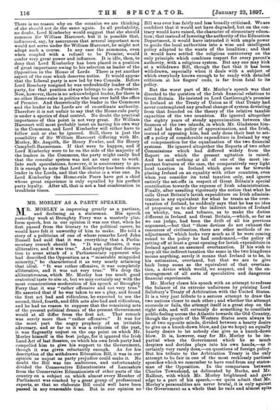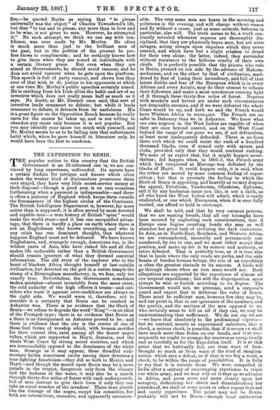MR. MORLEY AS I PARTY SPEAKER.
MR. MORLEY is improving greatly as a partisan, and declining as a statesman. His speech yesterday week at Broughty Ferry was a masterly plat- form speech, but in our opinion it was one that, when he first passed from the literary to the political career, he would have felt it unworthy of him to make. He told a story of a politician of one of whose remarks Lord John Russell had said that it was everything that a Parlia- mentary remark should be. "It was offensive, it was alliterative, and it was true." And applying that descrip- tion to some attack of a Parliamentary opponent who had described the Opposition as a "miserable misguided minority," he characterised it as very nearly attaining that ideal. "It was rather offensive, it was completely alliterative, and it was not very true." We drop the alliterativeness, which Mr. Morley has too much good oratorical taste to aim at, but we may certainly say with the most conscientious moderation of his speech at Broughty Ferry that it was "rather offensive and not very true.' He asserted that if he was taken to see a play, and found the first act bad and ridiculous, he expected to see the second, third, fourth, and fifth acts also bad and ridiculous, and he had no reason to suppose that the remaining acts of the present political drama of the present Government would at all differ from the first act. That remark was surely more than "rather offensive." It was for the most part the angry prophecy of an irritable adversary, and so far as it was a criticism of the past, it was flagrantly unjust on the one point on which Mr. Morley himself is the best judge, for it ignored the Irish Land Act of last Session, on which his own Irish party had compelled him to give his support to the Government, though it was given reluctantly enough. As for his description of the withdrawn Education Bill, it was in our opinion as unjust as party prejudice could make it. No doubt the Bill was too ambitious, and unfortunately divided the Conservative Educationists of Lancashire from the Conservative Educationists of other parts of the country on a subject on which almost every Member of Parliament was coached by a great group of professional experts, so that no elaborate Bill could well have been passed in any reasonable time. But in our opinion no Bill was ever less fairly and less broadly criticised. We are confident that it would not have degraded, but on the con- trary would have raised, the character of elementary educa- tion; that instead of lowering the authority of the Education Department, it would have intrusted it with ample power to guide the local authorities into a wise and intelligent policy adapted to the wants of the localities ; and that it would have settled the religious controversy on the only principle which combines respect for every parent's authority, with a religious system. But any one may kick at a withdrawn Bill, though the fact that it has been withdrawn, especially when it deals with a subject of which everybody knows enough to be ready with detailed criticism at his fingers' ends, is far from fatal to its policy.
But the worst part of Mr. Morley's speech was that directed to the question of the Irish financial relations to Great Britain. He insisted on Lord Castlereagh's promise to Ireland at the Treaty of Union as if that Treaty had never contemplated any gradual change of system deviating from that founded on the theory of the relative taxable capacities of the two countries. He ignored altogether the eighty years of steady approximation between the finances of the two islands, in which Mr. Gladstone him- self had led the policy of approximation, and the Irish, instead of opposing him, had only done their best to set- off a policy of considerable expenditure in Ireland by way of compensation for the equalisation of the two financial systems. He ignored altogether the Reports of two other Commissions which had differed widely from the Report on which the present agitation is raised. And he said nothing at all of one of the most im- portant features of the case, the comparatively very light local taxation in Ireland which goes so far towards placing Ireland on an equality with other countries, even when you consider its total taxation only, and ignore entirely the set-offs in respect of Great Britain's special contribution towards the expense of Irish administration. Finally, after assailing vigorously the notion that what he calls Great Britain's lavish expenditure on Irish adminis- tration is any equivalent for what he treats as the over- taxation of Ireland, he suddenly says that he has no idea of proposing so to alter the indirect taxation of Ireland on whisky, tea, and tobacco, as to make the duties different in Ireland and Great Britain,—which, so far as we can judge, had been the drift of all his previous argument,—but that "these devices do not exhaust the resources of civilisation, there are other methods of re- adjustment," which looks very much as if he were coming round to the policy he had condemned,—the policy of setting off at least a great opening for lavish expenditure in Ireland against an assumed overtaxation. If his wish to keep all the indirect taxation the same in the two kingdoms means anything, surely it means that Ireland is to be, in his estimation, overtaxed, but that we are to give back lump sums as the equivalent of that overtaxa- tion, a device which would, we suspect, end in the en- couragement of all sorts of speculative and dangerous financial experiments.
Mr. Morley closes his speech with an attempt to redress the balance of its extreme unfairness by praising Lord Salisbury's Treaty of Arbitration with the United States. It is a very just tribute to a serious attempt to draw the two nations closer to each other ; and whether the attempt succeeds or fails, the attempt itself is a great step on the right side, and will certainly do something to conciliate public feeling across the Atlantic towards the Old Country, though the people of the Western States seem always to be of two opposite minds, divided between a hearty desire to give us a knock-down blow, and (as we hope) an equally hearty desire to let nobody else give us a knock-down blow. It is, however, easy for Mr. Morley to be im- partial when the Government which he so much despises and derides plays into his own hands,—as it certainly very rarely does,—on questions of foreign policy. But his tribute to the Arbitration Treaty is the only attempt to be fair in one of the most recklessly partisan speeches which we remember to have read from any states- man of the Opposition. In the comparison between Charles Townshend, as delineated by Burke, and Mr. Balfour, with which Mr. Morley brightened and gave edge to a part of his speech,—we quite admit that Mr. Morley's personalities are never brutal, it is only against the Government as a whole that he rails and almost spits fire,—he quoted Burke as saying that " to please universally was the object" of Charles Townshend's life, but that "to tax and to please, any more than to love and to be wise, is not given to men. However, he attempted it." No such attempt, we think we can say with con- fidence, was ever made by Mr. Morley. He often is much more than just to the brilliant men of the past, but in the politics of the present be pre- fers blows to compliments ; and he certainly knows how to give them when they are aimed at individuals, with a certain literary grace. But even when they are aimed at Governments, he should avoid rancour, and he does not avoid rancour when he gets upon the platform. This speech is full of party rancour, and shows less than ever of that wish to do justice to his opponents at which at one time Mr. Morley's public speeches certainly aimed. He is catching from his Irish allies the habit and art of an invective which does not really mean half as much as it says. No doubt, as Mr. Disraeli once said, that sort of invective lends ornament to debate ; but while it lends ornament to debate, it detracts from its usefulness. His is a great figure on the Opposition Bench because he really cares for the causes he takes up, and is not willing to abandon any cause only because it is not popular. But you may identify your cause too much with yourself, and Mr. Morley seems to us to be falling into that unfortunate habit which, when he gave himself to literature only, he would have been the first to condemn.



































 Previous page
Previous page